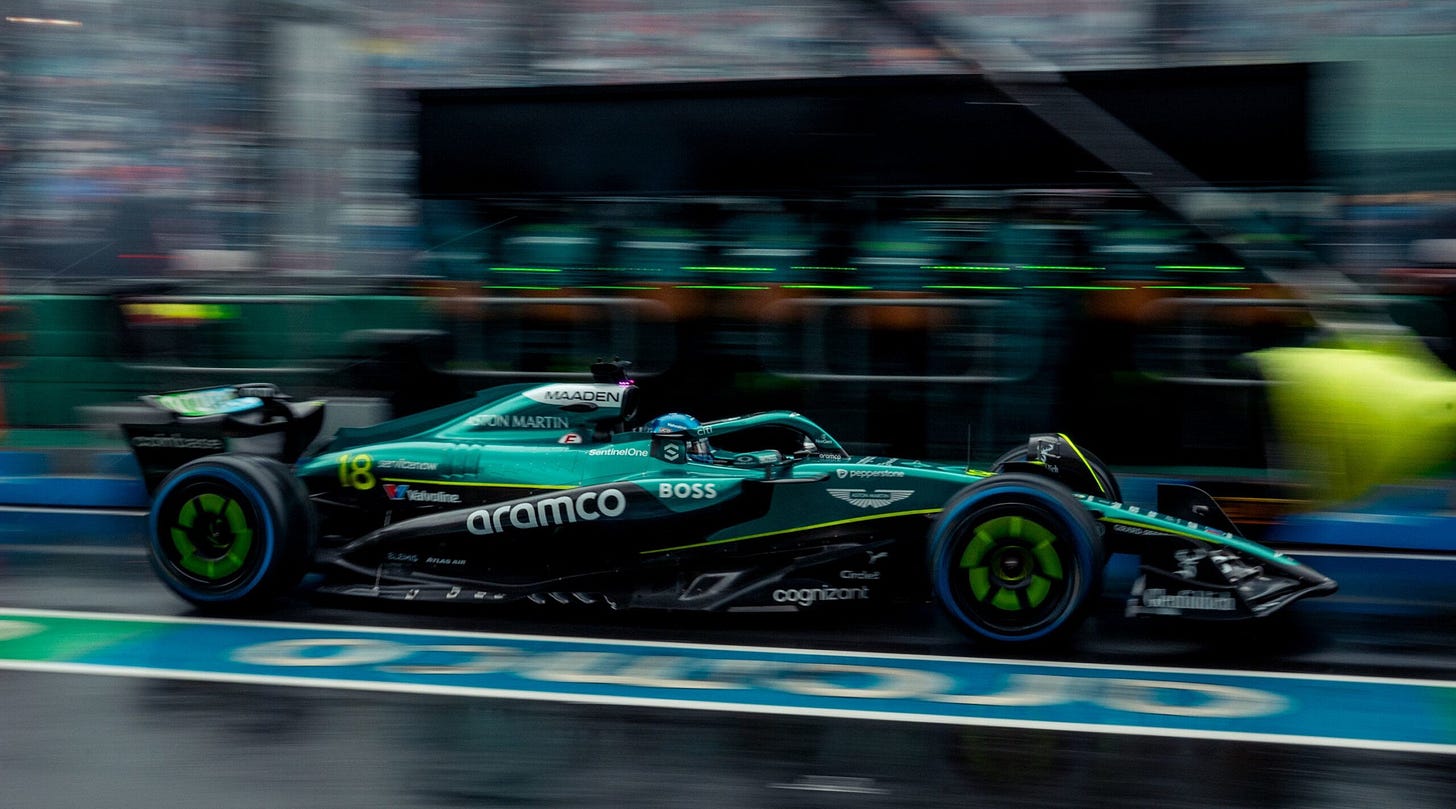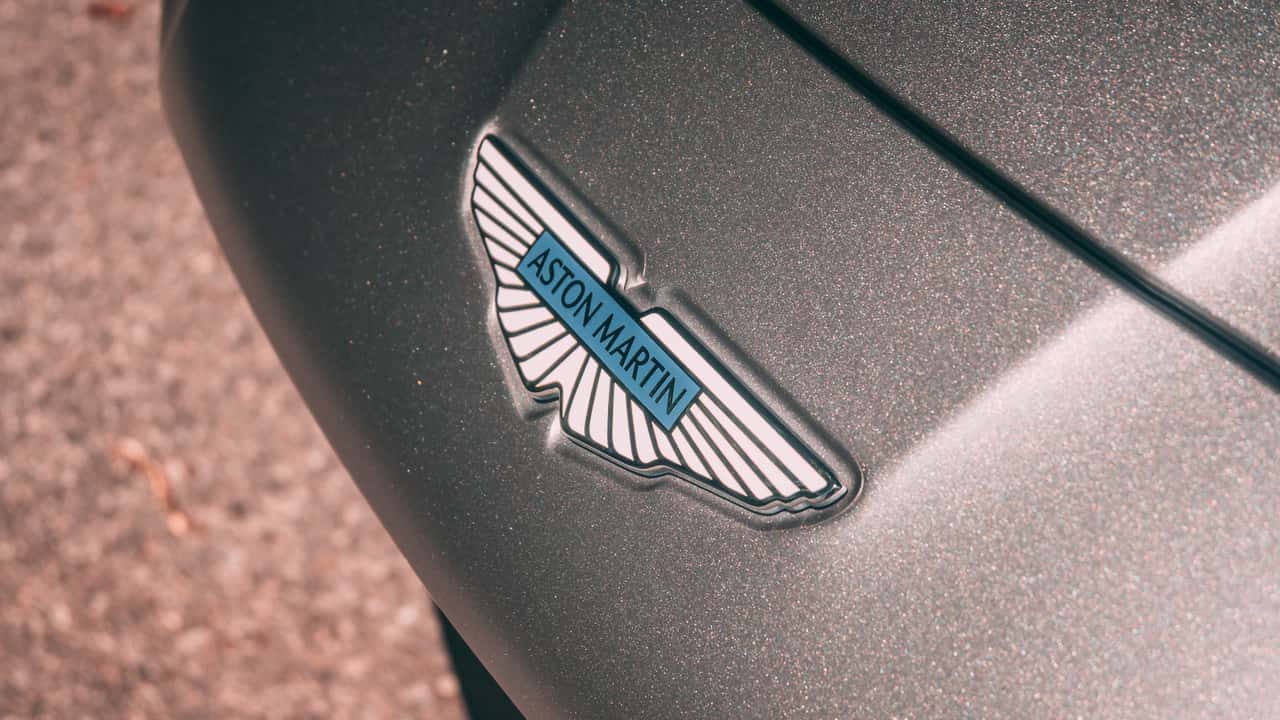The Tale of Two Astons
How F1's Billion-Dollar Dream Outpaces the Road Car's £1.4B Nightmare
You are receiving this email because you subscribed to Business of Speed, the newsletter for those wanting to stay ahead on what’s happening behind the scenes. I’m Vincenzo Landino, a business, tech, and F1 commentator. I’ve spent the last ten years at the intersection of content, partnerships, and the business of motorsport. This newsletter is where I break down what’s working, what’s shifting, and what’s next without the PR gloss. Thank you for being here.
I've always been fascinated by how the same brand can tell completely different financial stories.
This week, Aston Martin Lagonda just sold its 4.6% stake in the Aston Martin F1 team for $146 million—valuing the racing operation at $3.2 billion. That's more than triple the struggling Aston Martin Lagonda's entire market cap of just over $1 billion.
Here's what makes this deal so remarkable: while Aston Martin's road car business drowns in debt and slashes guidance, the F1 counterpart races ahead as one of motorsport's most valuable franchises.
This is a perfect example of how brand equity can create wildly different fortunes across two businesses sharing the same iconic name.
The Story in The Numbers
The contrast couldn't be starker, and the data from Aston Martin's latest results is genuinely shocking:
Road Car Business (H1 2025):
Revenue: Down 25% to £454 million
Gross profit: Down 46% to £126 million
Operating losses: Widened to £134 million
Net debt: Ballooned to £1.38 billion
Guidance: Slashed from "positive" to "breaking even"
F1 Team Valuation:
Current value: $3.2 billion
Sale price: 50% higher than projected
Ownership structure: Profitable and investor-friendly
Meanwhile, the car company's stock has lost over 90% of its value since its initial public offering in 2018, at £19 per share. Today? It trades around 71 pence. That’s roughly $0.95 for the Americans reading this.
The Perfect Storm Crushing Luxury Cars
Aston Martin's automotive woes aren't happening in isolation. The luxury car sector faces what I call the "brutal trifecta": punishing U.S. tariffs, collapsing Chinese demand, and mounting EV transition costs.
Under recent trade agreements, British vehicles face a 10% tariff on the first 100,000 imports annually, followed by a 27.5% tariff beyond that—a quota system that CEO Adrian Hallmark calls unfair to smaller manufacturers. For a company that sells fewer than 7,000 cars annually, every export matters.
China, once a growth engine, has turned toxic. Premium luxury demand has "fallen sharply" as local brands dominate the EV transition. Even ultra-wealthy buyers, historically "less sensitive to inflation and economic cycles", are feeling the pressure.
The debt burden makes everything worse. With £1.38 billion in net debt and roughly £120 million in annual interest payments, Aston Martin is trapped in a financial prison where every operational setback gets magnified.
Why F1 Teams Are Financial Gold Mines
Here's what most people don't understand about modern Formula 1: Liberty Media's transformation since 2017 has turned racing teams into legitimate investment assets.
The sport now generates $3.2 billion in annual revenue, and according to Forbes, all 10 F1 teams are now valued above $1 billion, with Ferrari leading at $4.78 billion.
What makes F1 teams so valuable? Three words: scarcity, stability, and storytelling.
There are only 10 spots on the grid. Budget caps have introduced profitability. Global media exposure generates marketing value that extends beyond racing results.
Lawrence Stroll's $250 million Silverstone headquarters and recruitment of Adrian Newey aren't just racing investments—they're brand-building exercises that attract sponsors like Aramco and create franchise value.
The Going Private Gambit
Industry analysts suggest Aston Martin could solve its public market struggles by going private. "Simplifying the ownership structure could improve agility, attract long-term partners, and reduce the administrative and financial burdens of public listing," notes Third Bridge analyst Orwa Mohamad.
Lawrence Stroll, whose Yew Tree Consortium now owns 33% of the company, has been coy about privatization but clearly frustrated with the valuation. "The company is significantly undervalued and its market valuation around £650 million is a joke," he stated.
Going private would free Aston Martin from quarterly earnings pressure and allow for the patient capital needed to execute its EV transition and product refresh.
The Lesson in Brand Value
Aston Martin's saga illustrates how the same brand can generate vastly different investor outcomes. The F1 team leverages scarcity, global exposure, and regulatory stability to create value from intellectual property and marketing rights. The automotive industry grapples with capital intensity, supply chain disruptions, and cyclical consumer demand.
The F1 stake sale represents everything the road car business isn't: a premium asset in a growth market with predictable revenue streams and passionate global audiences.
What's Next?
The $146 million injection from the F1 stake sale buys time, not transformation. Aston Martin still faces the same fundamental challenges: weak demand, tariff exposure, massive debt, and the capital requirements of launching new models.
The company projects positive free cash flow in H2 2025, but that's against a backdrop of declining volumes and margin pressure. For investors, this split identity serves as a cautionary tale about the balance between brand value and business fundamentals.
Lawrence Stroll's empire may share the same iconic name, but only one side of his business is built for speed. The other is still searching for an exit from the slow lane.
What do you think—should Aston Martin go fully private to escape the public market pressure? Hit reply and let me know your take.
Business of Speed breaks down the money, deals, and power plays driving the biggest stories in motorsport. Forward this to someone who needs to understand why F1 teams are the new sports franchises.
And if you enjoyed this breakdown, subscribe to Business of Speed for more on the business behind Formula 1 and motorsport. Let's connect the dots. And, if you're a brand eyeing motorsport or looking to get more out of your current motorsport partnership, let’s work together.
IS YOUR MOTORSPORT INVESTMENT MOVING THE NEEDLE?
MOST MOTORSPORT SPONSORSHIPS ARE JUST EXPENSIVE LOGO PLACEMENT.
YOURS DOESN'T HAVE TO BE.
FREE Speed Audit Reveals:
✅ The hidden ROI gaps in your current motorsport strategy
✅ 3 immediate opportunities to amplify your racing investment
✅ Your "Sponsorship Performance Score"
✅ A custom action plan to turn exposure into engagement









